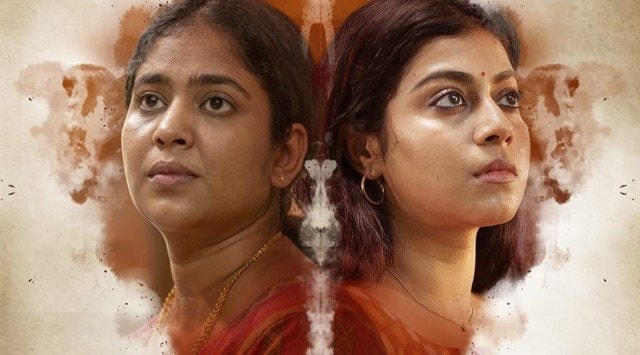There is an inherent dissatisfaction and vexation that arises when men narrate the stories of women or even portray female characters. It predominantly emanates a lack of comprehension, empathy, and purpose. While there may be a few exceptions, this holds true for most films. Furthermore, it becomes even more exasperating to witness films that claim to delve into women’s issues and desires, but ultimately conform to the stereotypical dramatic archetype with a female lead.
Rajesh K Raman’s Neeraja, starring Shruti Ramachandran, Jinu Joseph, Abhija Sivakala, Srindaa, and Guru Somasundaram, falls into the same pattern. The film is a remake of the 2018 Kannada film Nathicharami, directed by Mansore and starring Sruthi Hariharan, which garnered five awards at the 66th National Film Awards.

Neeraja narrates the story of a widow who tragically lost her husband in an accident. Owing to the profound love she still holds for her partner Alex (Govind Padmasoorya), Neeraja (Shruti Ramachandran) finds it difficult to let go of the cherished memories they shared and constantly seeks to relive those precious moments. She finds solace in preserving their apartment, keeping reminders of their special moments through wind chimes and meticulously maintaining the living room exactly as it was before the tragic event. Neeraja remains “devoted” to her late husband, leading her on a cyclical journey.
However, as time passes, she realises that neglecting her own physical needs has taken a toll on her emotional and mental well-being. Unwanted advances from men, pressure from her parents to remarry, and the sympathy she receives from society add to her burden. Thus, Neeraja turns to a compassionate psychiatrist (Guru Somasundaram) who offers affirmation and reassurance. He helps her understand that longing for sexual fulfilment is natural and that being a widow should not burden her with guilt.
Although Neeraja tries to explore new connections, she grapples with the fear of “betraying” her late husband. It is during this struggle that she encounters Arun (Jinu Joseph), who is leading an unhappy marriage with Meera (Srindaa). Neeraja gradually develops feelings for Arun, and a delicate bond begins to form between them. The remainder of the film focuses on their journey and how they navigate the complexities of their newfound connection.
Despite addressing a significant and thought-provoking topic, Neeraja falls short of fulfilling its intended purpose. The film suffers greatly due to a lack of comprehension regarding female emotions, particularly in scenes that necessitate a deeper understanding. Moments depicting Neeraja’s vulnerability and every scene featuring Meera feel lacking in thorough research. The dialogues come across as contrived, and most moments feel forced, giving the impression that the entire movie was constructed solely around the plot, neglecting the exploration of characters and their diverse struggles.
Subsequently, Neeraja lacks the inherent naturalness that was present in the original version, Nathicharami. The film’s absence of authenticity can largely be attributed to excessive sanitisation.
Story continues below this ad
Writer-director Rajesh K Raman’s script demonstrates a notable absence of understanding regarding the intricacies of the characters themselves, which becomes evident through the portrayal of each and every individual on screen. Despite attempts to avoid one-dimensionality by providing purpose and varied characteristics to the characters, they ultimately feel incomplete, which was not the case in Nathicharami. The result here is a film that leaves much to be desired in terms of authenticity and depth.
The makers’ attempt to explore the theme of women’s sexual desires ultimately falls flat due to its mishandling. Despite intending to question society’s adherence to convenient and male-centric morality, the narrative and visual presentation remain trapped in traditional and predictable styles. This reluctance to break free from conventional norms is evident in various aspects of the film. A glaring example of this is evident when Neeraja purchases a vibrator; however, the film refrains from exploring this further or depicting her use of the item, likely out of fear of potential rejection from “family audiences”. Nathicharami, though not explicitly, had a scene showing the central character using it.
Similarly, despite repeatedly emphasising the importance of acknowledging and embracing women’s physical needs without shame, the film fails to depict Neeraja experiencing sexual pleasure or coming close to it. Instead, the movie concludes with a disappointing and unrealistic ending, offering false hope for a brighter future for Neeraja, again contrary to its original version. This can only be seen as a reflection of the filmmakers’ lack of honesty and courage in fully portraying such a topic.
The film thus misses opportunities to challenge societal norms and lacks the courage to delve into the subject matter with the necessary honesty and sincerity. The portrayal of Meera, the second significant female character in the film, portrayed by Srindaa, reflects uninspired and unempathetic writing. Meera’s character solely exists to seek the affection of her husband, who has consistently subjected her to emotional abuse, in both films. This depiction clearly highlights that the movie cannot be deemed women-centric in any way.
Story continues below this ad
Furthermore, the character portrayed by Jinu Joseph also lacks substance and can be perceived as a mere addition to an already faltering narrative. The inclusion of unnecessary, self-righteous dialogues by male characters within the film can only be interpreted as an attempt to insert the “not all men” narrative.
Shruti Ramachandran delivers a decent performance, but the lack of inspiration in the script hinders her portrayal, making it appear somewhat forced. While Jinu Joseph manages to break away from his previous typecasting as a ruthless villain to some extent, traces of the same archetype can still be found in certain scenes. On the other hand, the poorly developed character of Srindaa leaves her commendable performance feeling awkward and cringe-inducing. The sporadic appearances and disappearances of characters portrayed by Kottayam Ramesh, Sminu Sijo, Santhosh Keezhattoor, Shruthi Rajanikanth, Arun Kumar, and Raghunath Paleri contribute to the wearisome viewing experience. The portrayal of Guru Somasundaram’s typecasted character becomes underwhelming and fails to satisfy.
However, amidst these drawbacks, Abhija Sivakala shines as a domestic worker and becomes the standout element in an otherwise tiring film. Nevertheless, it is important to address the problematic trend of typecasting her solely as a domestic worker or a character confined to a life of hardships.
Although Ragesh Narayanan’s cinematography is commendable, the songs by Sachin Shankor Mannath, along with Vinayak Sasikumar’s lyrics, fall short. The final song in the film, which aims to highlight the magnificence of women, comes across as a forced endeavour to convince the audience of the filmmakers’ intentions after having failed till now.
Story continues below this ad
In summary, Neeraja not only disappoints as a respectable remake but also falls short as a film centred around women. This further enables critics to argue that such narratives are limited to urban settings and won’t resonate with the wider “common audiences”.
Neeraja movie cast: Shruti Ramachandran, Jinu Joseph, Abhija Sivakala, Srindaa, Guru Somasundaram
Neeraja movie director: Rajesh K Raman
Neeraja movie rating: 1.5 stars




































